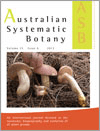
AUSTRALIAN SYSTEMATIC BOTANY
Scope & Guideline
Cultivating Knowledge in Systematic Botany
Introduction
Aims and Scopes
- Taxonomy and Classification:
The journal emphasizes the classification and taxonomic revision of various plant families and genera, providing updated nomenclature and descriptions of new species. - Phylogenetics and Molecular Studies:
Research articles often utilize molecular techniques to elucidate phylogenetic relationships among plant species, contributing to the understanding of evolutionary patterns. - Biogeography:
The journal explores biogeographical patterns and endemism, particularly within Australian flora, aiding in conservation strategies and ecological understanding. - Conservation Biology:
Papers frequently address conservation issues related to plant diversity, focusing on threatened species and their ecological significance. - Morphological and Environmental Analysis:
The journal publishes studies that integrate morphological traits with environmental data to understand species variation and adaptation in different habitats.
Trending and Emerging
- Integrative Taxonomy:
An increasing number of studies combine molecular, morphological, and ecological data to provide a more comprehensive understanding of species boundaries and relationships. - Population Genomics and Conservation:
Research focusing on multispecies population genomics is gaining traction, emphasizing the importance of genetic diversity in conservation strategies for threatened species. - Cryptic Species Delimitation:
There is a growing interest in identifying cryptic species through molecular analyses, which is crucial for accurate biodiversity assessments and conservation efforts. - Phylogenomics:
The use of phylogenomics is on the rise, providing deeper insights into the evolutionary history and relationships of plant groups, thus refining taxonomic classifications. - Environmental and Ecological Correlations:
Studies exploring the correlation between plant traits and environmental factors are becoming more prominent, enhancing understanding of plant adaptation and resilience.
Declining or Waning
- Traditional Morphological Studies:
There has been a noticeable decrease in studies relying solely on traditional morphological methods without molecular support, indicating a shift towards integrative approaches. - General Flora Surveys:
Broad surveys of flora that do not focus on specific taxonomic revisions or phylogenetic analyses are less common, as researchers increasingly prioritize detailed, targeted studies. - Historical Taxonomy without Modern Techniques:
Papers that solely rely on historical taxonomic classifications without incorporating modern molecular or genetic data are becoming less frequent, as the field moves towards more rigorous scientific methodologies.
Similar Journals

BRITTONIA
Elevating Plant Science Research Since 1931BRITTONIA, published by Springer, stands as a reputable journal dedicated to advancing the fields of botany and plant sciences. With a storied history dating back to 1931, this journal has evolved to embrace contemporary research spanning various aspects of plant biology, ecology, and systematics. Focusing on a comprehensive analysis of both ecological interactions and plant systematics, BRITTONIA plays a crucial role in disseminating knowledge among researchers and professionals committed to understanding plant life and its environmental contexts. Despite its open access status being currently unavailable, the journal ensures wide accessibility through institutional subscriptions. In the latest rankings, it proudly holds a Q2 category in Plant Science and a Q3 category in Ecology, Evolution, Behavior, and Systematics, indicating its growing influence and academic rigor. Researchers and students alike will find BRITTONIA an essential resource for the latest findings and discussions in plant sciences.
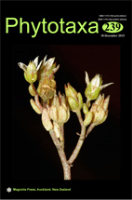
Phytotaxa
Bridging the Gap in Plant Science KnowledgePhytotaxa, published by MAGNOLIA PRESS, is an esteemed journal in the fields of Plant Science and Ecology, Evolution, Behavior and Systematics. Established to cater to the growing need for high-quality research dissemination in botany, this journal presents the latest findings in plant taxonomy, systematics, and biodiversity. With its H-Index reflecting significant academic influence, and recognized as Q2 in Plant Science and Q3 in Ecology by Scopus, it stands as a reputable source for scholars and practitioners alike. The journal operates without open access restrictions, allowing for a wider reach to its audience. Positioned in New Zealand, Phytotaxa has been pivotal since its inception, contributing to the global understanding of plant diversity and ecology from 2010 to 2024. Its rigorous peer-review process ensures the high quality of published articles, making it an essential resource for researchers, professionals, and students dedicated to advancing the field of botany.

TELOPEA
Navigating the Complexities of Ecology and EvolutionTELOPEA is a distinguished scholarly journal published by the Natl Herbarium New South Wales, focusing on the rich fields of Ecology, Evolution, Behavior, and Systematics, as well as Plant Science. With an ISSN of 0312-9764 and an E-ISSN of 2200-4025, the journal has been a significant contributor to the understanding of plant biodiversity and ecosystem dynamics since its inception in 1984, with regular publication resuming in 2006 through to 2024. Residing in the beautiful Australian Botanic Garden at Mount Annan, NSW, TELOPEA operates under a Q3 ranking for both Ecology and Plant Science as of 2023, reflecting its relevance and contribution to these critical scientific disciplines. Though it does not offer open access, the journal remains an essential resource for researchers and professionals seeking to contribute to and stay abreast of the latest developments in plant sciences and ecological research. With a commitment to rigorous peer review and the dissemination of high-quality research, TELOPEA stands as a vital platform for advancing knowledge in the realm of plant ecology and systematics.

PRESLIA
Elevating Plant Science to New HeightsPRESLIA, published by the Czech Botanical Society, is an esteemed academic journal that has been contributing to the fields of Ecology and Plant Science since its inception in 1979. With an impressive Q1 ranking in both categories for 2023, it stands out among its peers as a vital resource for researchers, professionals, and students alike. The journal is dedicated to disseminating high-quality research that advances our understanding of botanical sciences, encompassing a diverse array of topics from plant ecology to conservation strategies. With a ranking of #110 out of 516 in Plant Science and #103 out of 461 in Ecology on Scopus, PRESLIA consistently maintains a high impact, reflecting its crucial role in shaping contemporary scientific discourse. While traditional access options are available, the journal's commitment to fostering academic collaboration makes it a key player in the global scientific community. Located in Prague, Czech Republic, PRESLIA continues to bridge gaps in research and offers a platform for innovative scholarly communication up until 2024 and beyond.
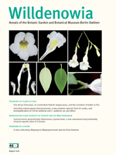
Willdenowia
Connecting researchers to the heart of botanical science.Willdenowia is a prestigious scientific journal published by the Botanischer Garten & Botanische Museum Berlin-Dahlem, dedicated to advancing the field of botany and plant sciences. With an ISSN of 0511-9618, this journal has established itself as a crucial platform for researchers, practitioners, and students interested in ecology, evolution, behavior, systematics, and plant science. The journal boasts an impactful reputation, evidenced by its impressive Q1 and Q2 quartile rankings in Plant Science and Ecology, Evolution, Behavior and Systematics respectively, as well as notable Scopus rankings, placing it within the top quartiles of its categories. Although access is not open, articles published in Willdenowia contribute significantly to the global body of botanical research, making it an essential resource for anyone looking to deepen their understanding of plant biology and related ecological disciplines. The journal has continuously evolved since its inception and aims to facilitate interdisciplinary collaboration and knowledge dissemination in the life sciences.
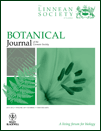
BOTANICAL JOURNAL OF THE LINNEAN SOCIETY
Fostering Innovation in Botanical Research and TheoryThe Botanical Journal of the Linnean Society, published by Oxford University Press, stands as a premier platform for interdisciplinary research within the realms of Ecology, Evolution, Behavior, and Plant Science. With a notable impact factor reflective of its esteemed reputation, this journal is classified in the Q1 quartile for both Ecology and Plant Science, placing it among the most influential publications in these fields. Since its inception in 1969, and with an anticipated convergence of research extending to 2024, it has become essential for scholars and professionals seeking to engage with cutting-edge studies, theoretical frameworks, and practical applications that drive our understanding of plant biology and ecological systems. The journal’s commitment to excellence is underscored by its robust Scopus rankings—achieving an impressive 83rd percentile in Ecology and a 82nd percentile in Plant Science. This makes the Botanical Journal of the Linnean Society a crucial resource for researchers, educators, and students alike, eager to advance their knowledge and contribute to the evolving discourse in botany and environmental studies.

TURKISH JOURNAL OF BOTANY
Connecting researchers to the world of botany.Welcome to the TURKISH JOURNAL OF BOTANY, a prestigious publication dedicated to advancing the field of plant science. Established in 1990 and published by the Tubitak Scientific & Technological Research Council Turkey, this journal serves as a vital platform for researchers, professionals, and students to disseminate their findings and insights on various botanical topics. With an impressive H-index that underscores its academic influence and recognition in the field, the journal is positioned in the Q2 quartile of plant science according to the latest category rankings. The ISSN of the journal is 1300-008X and the E-ISSN is 1303-6106, ensuring broad accessibility in both print and digital formats. As of 2023, it ranks #213 out of 516 in Scopus for Agricultural and Biological Sciences, placing it in the 58th percentile, which highlights its competitive standing among botanical journals. Researchers are encouraged to engage with its open-access options where available, fostering a collaborative and accessible research environment. With its commitment to quality and scientific rigor, the Turkish Journal of Botany remains an essential resource for anyone engaged in the exploration of plant sciences.
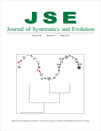
Journal of Systematics and Evolution
Innovating Understanding in Evolutionary BiologyThe Journal of Systematics and Evolution, published by WILEY, is a premier academic journal dedicated to advancing the fields of Ecology, Evolution, Behavior, and Systematics and Plant Science. With a distinguished Q1 ranking in both of these critical categories in 2023, it stands at the forefront of scientific research, placing it in the top quartile among its peers. Featuring both an ISSN of 1674-4918 and an E-ISSN of 1759-6831, the journal has been converging innovative research since its inception in 2008. The journal caters to a global audience of researchers, professionals, and students, providing a platform for disseminating significant findings and fostering academic dialogue. Its impressive Scopus rankings further affirm its impact, coming in at Rank #62/721 in Ecology and Rank #48/516 in Plant Science, highlighting its relevance and influence in these vibrant fields. As an open-access journal, it ensures that groundbreaking research is accessible to all, thus enhancing collaborative opportunities within the scientific community.

Mediterranean Botany
Fostering Insights into Mediterranean Vegetation DynamicsMediterranean Botany is a distinguished peer-reviewed journal dedicated to the flourishing fields of Ecology, Plant Science, and Ecology, Evolution, Behavior and Systematics. Published by the Universidad Complutense de Madrid, Servicio Publicaciones, this Open Access journal has been disseminating valuable research since 2018, ensuring that findings are accessible to a global audience, with an emphasis on Mediterranean vegetation and biodiversity. With an ISSN of 2603-9109, it contributes significantly to the academic discourse in its category quartiles, recently featuring in Q3 for Ecology and related fields. Notably, Mediterranean Botany ranks within the top half of its category in Scopus, highlighting its relevance and contribution to the scientific community. Researchers, professionals, and students alike will find the journal to be a vital resource for latest discoveries, trends, and conservation strategies in Mediterranean ecosystems, positioning it as an essential platform for advancing knowledge and fostering collaboration within the plant sciences.

PLANT SYSTEMATICS AND EVOLUTION
Illuminating the Path of Plant EvolutionPlant Systematics and Evolution is a prestigious journal published by Springer Wien, dedicated to advancing research within the fields of plant taxonomy, evolution, and ecology. With its ISSN 0378-2697 and E-ISSN 1615-6110, this journal has been pivotal in shaping the scientific landscape since its inception in 1974. Based in Austria, it occupies a significant position in the academic community, being ranked in the Q2 quartile in both Ecology, Evolution, Behavior and Systematics and Plant Science as of 2023. This high-impact journal is recognized for its rigorous peer-review process and is indexed among the top publications in its category, holding a Scopus rank of #176 out of 516 in Plant Science and #252 out of 721 in Ecology, highlighting its relevance and quality in the research community. Although it does not currently offer open access, the journal is committed to making significant contributions to the understanding of plant biodiversity and evolutionary processes. This makes it an essential resource for researchers, professionals, and students aiming to know the latest developments in the study of plant systematics and evolution.